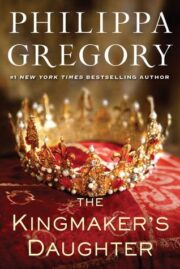She was the daughter of the Earl of Warwick, known in his lifetime as ‘the kingmaker’ because of his extraordinary role as puppeteer to the claimants of royal power in England. First he supported Richard Duke of York, then his son and heir Edward, then the second son George, then their enemy Henry VI. Warwick died fighting for the House of Lancaster, having lived his life as the great supporter of the House of York.
Anne, although a young woman, moved with her father through these twists and turns of loyalty. She attended the coronation dinner of the new queen of the House of York and witnessed her father’s gradual exclusion from the court, which became dominated by the Rivers family and adherents. As the novel describes, Anne fled with her father into exile in France, returning to England as his new candidate for queen, at the head of a Lancaster army, married to their Prince of Wales, and in little more than a year was married into the house of her enemy: York. It is at this point that I suggest that the young woman, who had lost her father and her husband, and whose mother had abandoned her, took her life into her own hands. Nobody knows the true story of how Anne escaped from the protection or imprisonment of her sister and brother-in-law. We have no reliable account – but some wonderful versions – of her courtship and marriage to Richard. My version of these stories is to put Anne at the heart of things.
It was fascinating to me as a novelist to portray the York court as a centre of intrigue and a source of fear for the Warwick girls. Part of the joy of writing this series based on rivals and enemies is turning the page upside down (as it were) and seeing a totally different picture. As an historian the known facts looked very different when I changed my viewpoint from my favourite, Elizabeth Woodville, to my new heroine, Anne Neville. The confused conspiracy around the death of Isabel and the judicial murder of George suddenly becomes a far darker story with Elizabeth as the villain.
Another reputation which I have had to address in this story is that of Richard III. As I suggest here and in The White Queen, I don’t subscribe to the Shakespearean parody that has blackened his reputation for centuries. But also I don’t acquit him of usurpation. He might not have killed the princes but they would not have been in the Tower without the protection of their mother except for his actions. What I think might have happened to the two royal boys is the subject of my next book, the story of their sister and Richard’s secret lover, Princess Elizabeth of York: The White Princess.
I list here the books which have been most useful to me in writing The Kingmaker’s Daughters.
BIBLIOGRAPHY
Baldwin, David, Elizabeth Woodville: Mother of the Princes in the Tower (Stroud, Sutton Publishing, 2002)
Baldwin, David, The Lost Prince: The Survival of Richard of York (Stroud, Sutton Publishing, 2007)
Baldwin, David, The Kingmaker’s Sisters (Stroud, The History Press, 2009)
Barnhouse, Rebecca, The Book of the Knight of the Tower: Manners for Young Medieval Women (Basingstoke, Palgrave Macmillan, 2006)
Castor, Helen, Blood & Roses: The Paston Family and the Wars of the Roses (London, Faber and Faber, 2004)
Cheetham, Anthony, The Life and Times of Richard III (London, Weidenfeld & Nicolson, 1972)
Chrimes, S.B., Lancastrians, Yorkists, and Henry VII (London, Macmillan, 1964)
Cooper, Charles Henry, Memoir of Margaret: Countess of Richmond and Derby (Cambridge, Cambridge University Press, 1874)
Duggan, Anne J., Queens and Queenship in Medieval Europe (Woodbridge, Boydell Press, 1997)
Field, P.J.C., The Life and Times of Sir Thomas Malory (Cambridge, D.S. Brewer, 1993)
Fields, Bertram, Royal Blood: King Richard III and the Mystery of the Princes (New York, Regan Books, 1998)
Gairdner, James, ‘Did Henry VII Murder the Princes?’, English Historical Review, VI (1891)
Goodman, Anthony, The Wars of the Roses: Military Activity and English Society 1452–97 (London, Routledge & Kegan Paul, 1981)
Goodman, Anthony, The Wars of the Roses: The Soldiers’ Experience (Stroud, Tempus, 2006)
Gregory, P., Jones, M., and Baldwin, D., The Women of the Cousins’ War (London, Simon & Schuster, 2011)
Griffiths, Ralph A., The Reign of King Henry VI (Stroud, Sutton Publishing, 1998)
Grummitt, David, The Calais Garrison, War and Military Service in England, 1436–1558 (Woodbridge, Boydell & Brewer, 2008)
Hammond, P.W., and Sutton, Anne F., Richard III: The Road to Bosworth Field (London, Constable, 1985)
Harvey, N.L., Elizabeth of York: Tudor Queen (London, Arthur Barker, 1973)
Haswell, Jock, The Ardent Queen: Margaret of Anjou and the Lancastrian Heritage (London, Peter Davies, 1976)
Hicks, Michael, False, Fleeting, Perjur’d Clarence: George, Duke of Clarence, 1449–78 (Stroud, Sutton, 1980)
Hicks, Michael, Warwick the Kingmaker (London, Blackwell Publishing, 1998)
Hicks, Michael, Richard III (Stroud, Tempus, 2003)
Hicks, Michael, Anne Neville: Queen to Richard III (Stroud, Tempus, 2007)
Hicks, Michael, The Prince in the Tower: The Short Life & Mysterious Disappearance of Edward V (Stroud, Tempus, 2007)


"The Kingmaker’s Daughter" отзывы
Отзывы читателей о книге "The Kingmaker’s Daughter". Читайте комментарии и мнения людей о произведении.
Понравилась книга? Поделитесь впечатлениями - оставьте Ваш отзыв и расскажите о книге "The Kingmaker’s Daughter" друзьям в соцсетях.